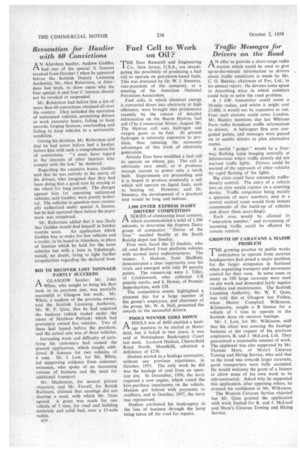Traffic Messages for Drivers on the Road
Page 58

If you've noticed an error in this article please click here to report it so we can fix it.
A N offer to provide a short-range radio station which could be used to give up-to-the-minute information to drivers about traffic conditions is made by Mr. C. 0. Stanley, chairman of Pye, Ltd., In his annual report. He devotes some space to describing ways in which scientists could help to solve the road problem.
A 1 kW. transmitter could cover a 10:mile radius, and whilst it might cost £5,000, it would not be expensive to run. Four such stations could cover London. Mr. Stanley mentions that last Whitsun Paris radio broadcast traffic information to drivers. A helicopter flew over congested points, and messages were passed on to enable drivers to plan alternative routes.
A useful " gadget " would be a fourway flashing lamp hanging centrally at intersections where traffic density did not warrant traffic lights. Drivers could be warned of the approach of other vehicles by rapid flashing of the lights.
Big cities could have automatic trafficdensity control. The entry of a vehicle into an area would register on a counting device. Traffic congestion being mainly a question of mere numbers, men in a central control room would form instant assessments of the build-up of vehicles and divert them accordingly.
Each area would be allotted its "saturation number,". and re-routeing of incoming traffic could be effected by remote control.
GROWTH OF CARAVANS A MAJOR PROBLEM
THE growing practice by public works contractors to operate from caravan headquarters had posed a major problem for the larger companies in Scotland when organizing transport and movement control for their vans. In some cases as many as 100 large caravans were used on site work and demanded fairly regular transfers and maintenance. The Scottish Licensing Authority, Mr. W. F. Quin, was told this at Glasgow last Friday, when Hector Campbell Wilkinson, Kilmacolm, sought a B licence for a vehicle of 3 tons to operate in the Scottish Area on caravan haulage.
Mr. J. Law, for Mr. Wilkinson, said that his client was entering the haulage business at the request of his previous employers, R. and J. McLeod, Ltd. They guaranteed a reasonable amount of work. The applicant was also supported by Mr. Thomas More, of More's Caravan Towing and Hiring Service, who said that as the trend was towards larger caravans, good transporters were fully occupied. He would welcome the grant of a licence to allow some of his own work to be sub-contracted. Asked why he supported this application, after opposing others, he stressed his confidence in Mr. Wilkinson.
The Western Caravan Service objected but Mr. Quin granted the application with work limited for R. and J. McLeod and More's Caravan Towing and Hiring Service.












































































































































































































































